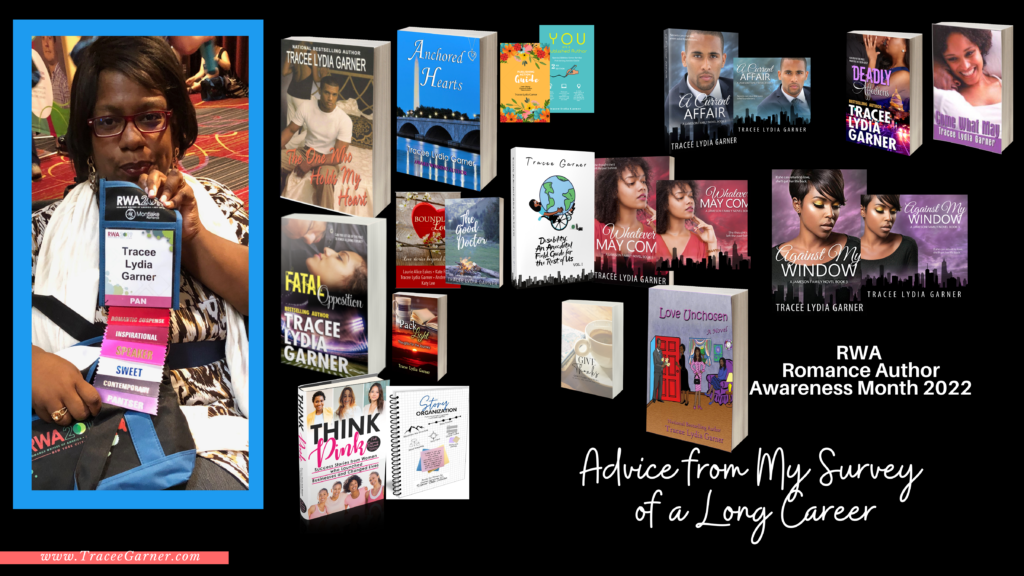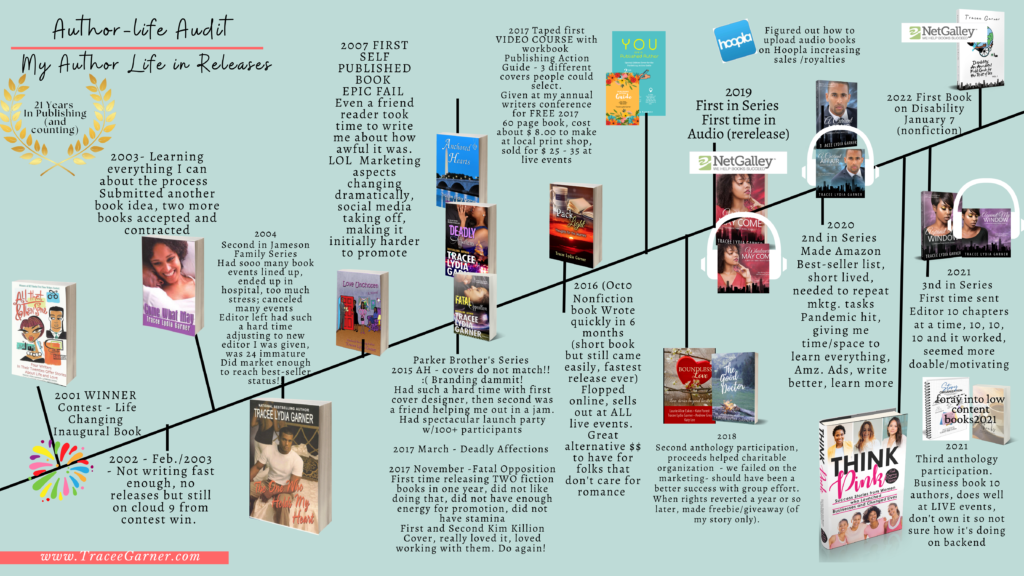
Recently, I decided to look back over ALL my books and experiences in my writing life, reflect and take a little time out to note the recurring themes, lessons and reflections that came about.
In the graphic above, I did this Ask Me Anything originally for RWA, which you can watch the recording if you are a member. For the rest of you, I’m outlining what I essentially said in the workshop.
The first thing to do is I’m going to talk about three areas that I’m evaluating in my review and reflection. Under each of those is what stood out for me and what I essentially am imparting to you in hopes that you can take advice and put it toward perspective on your own paths and journeys in your writing and publishing career. Right now, wherever you are, you CAN get a better view, gain clarity and start preparing for an even better next year, next month, next week. It’s not too late to start, or to change or to learn something new and to most importantly to decide to keep going on your path.
I. HOW IT STARTED?
In 2011, I won a contest win hosted by then BET Books, one of the largest publishers of African American romance at the time. It was a glorious time I’ll never forget. I got a trip to NYC to meet the editors, my award at the Awards Luncheon, a monetary advance, publication of the book and my life forever changed! You can read more about my reflections on the win and what it taught me, here in this blog post.
Shortly after that win and the euphoria, I somehow (don’t ask me how, except for the fact that I was buoyed by the win) I managed to come up with ideas and write two more books. I submitted them to a willing Editor and before I knew it, I had a two book deal. My editor who I loved and worked really well with would end up leaving and I’d be placed with another editor who I didn’t work with as well. That experience was upsetting and partly I knew both of us were to blame but I do know that at such a young age with little experience, I didn’t know how to take criticism and realize that any feedback wasn’t personal and it was all given in the spirit of enhancing the book and making it the best it could be for the market.
Lessons from How It Started?
That energy of writing the next two subsequent books only took a year. I was motivated and I was also striking while the iron was hot. I had some adopters to my work with the contest win, I would say the most important “adopters” I could have were those at the publishing house, familiar with me, believing in my writing abilities and taking a chance on me with real books that were not part of a contest win. We all need to strike while hot. We all could stand to learn the techniques that increase our productivity and output. These are important things to learn early on, and lastly we all need to learn the ins an douts of business, and arrive early to learning business tactics and develop a business mindset before we do anything. Only in the last 3 years of the 21 have I really taken time out for the business courses, for the tax learning and so much more. It’s never too early to start learning these aspects to secure your career.
In a book called Take Off Your Pants, by Libbie Hawker, I’ll be the first to admit, I’m a pantser, and while I think you should embrace whatever type of writer you are, it’s important to learn the techniques of other writer types. Pantsers should learn tips from Plotters and vice versa.
Write faster while younger – Aging is no joke. While I’m only in my mid forties, chronic conditions ride me and make me feel older, and increasingly more fatigue than I am if I were not disabled. I’m not saying you can’t write fast as an older writer, but let’s be real, a lot slows down, and that is why you need to both do as much as you can with youth on side but as you age, learn to embrace short cuts and for goodness sakes, LEARN TECHNOLOGY! The various tools I use including dictation (with MS Word and Google Docs – NOT Dragon, you don’t need it) to rapidly write this blog post, even, cannot be ignored. Get on board with tech, as there are way too many YouTube Videos to teach you how to do and use anything and EVERYTHING. There are no excuses to efficiency and to not learning something. The best thing about YouTube, the pause, and the rewind, and the speed settings is also worth mentioning. To save time, I often watch videos on 1.25, but if you need it, you can slow it down too to help you learn the concepts Tubers are talking about more easily.
In short order, here are just a few more quick tips:
Stop dilly-dallying – Time is of the essence, move it.
Pick a Lane – I tell folks that people who want a traditional contract can’t write about 13 subgenres in one book. They are looking for specific writers and that’s okay, that’s their business model. You want what they got, to be a part of that and if you don’t want to conform, self publish. There is nothing wrong with either lane. Self Publish what you want and conform to get a book deal, hybrid authordom can also be a lucrative thing. Moreover, if you do well at a publishing house, with a traditional contract or three or four or more, then you just may be able to chart your own course. You may very well have earned it (in sales numbers) to write whatever the heck you want but more often than not, you can’t start out the gate doing what you want.
Keep trying, keep submitting. I honestly believe that some folks who want a book deal aren’t willing to wait. There are numerous rejection stories about 30 and 40+ even 90 submissions later, rejection after rejection to finally getting the deal. Do you have what it takes to face rejection after rejection and still stick to it? It’s okay if you don’t but if you could just hold on, might you realize that elusive goal, one day?
Finally, everything is a lesson and NOT a loss. When you can step back from something (and yes, sometimes it takes years and hindsight viewing) you’ll see a lesson or two in the story where things did not go as you planned. I had a few bummed Self Published books and that’s okay. For one, it was early in the self publishing releases, no one was ready, self publishing still had a stigma. With another book I sell out in real life at events and it’s gone no where on line, and that’s okay.
II. HOW I’VE BEEN WRITING UP UNTIL NOW
The most important thing in your actual writing, how you come up with ideas, research, write, edit and eventually publish, is and should be a personal thing. There is no right or wrong way but here’s a brief rundown of my process:
1. I often start out with just a basic IDEA -and truly it’s often an emotion I want to explore, a problem or dilemma that speaks to me first
2. I will then work on that story, writing as much as I possibly can, getting to at minimum, about 50-68K words with little issue. Note that I’m not a linear writer, if I can’t think of something or need to research it, I will write in bold letters something like “Describe hotel here” and keep going with the story. I also highlight the issue that I need to revisit so it jumps out at me and I can find it later. Some of the hardest parts of writing for me, are the ending and less often, a sagging middle that I’ve decided needs a little shake up.
3. Highlight the holes – review them, sometimes pen and paper help with notes, but I’m not a story notetaker much, almost all of it happens in Word
4. Research
5. Pray for inspiration, take frequent breaks and Keep writing to the end
6. Edit on paper – Tracee
7. Editor (I’m ready to contact my freelance editor and send the document to him/her)
8. When I receive the changes back, I often accept all, print it out and read it afresh – I also edi on paper and read passages aloud. Reading aloud is an awesome way to hear how your story sounds and catch problem areas and mistakes. If you get hung up on certain sentences when reading your own work, there’s definitely a problem that needs fixing.
9. Pro Writing Aid – In the last few years, I bought the lifetime version, I have come to love PWA, it’s just an awesome that is not only about grammar issues but also analyzes and puts out more details about your work.
10. Rest, sit, and We’re done here. Upload to Amazon, and the other platforms I’m on for the launch and release of the book.
I encourage you to write down your processes for completing your own books as when you start doing this over and over for any length of time, it will be a helpful checklist for you to use and ensure you haven’t omitted any of the steps.
III. EMBRACING TECHNOLOGY and PAYING FOR TECH
There are two videos I created that will give you a better look into the technology and software programs I use to get my writing done. One of them was a Plan with Me that I did last month, the second is a review of what everything costs for the programs I use.
Click here to watch MY FIRST, EVER PLAN WITH ME, video where I share some of the tools I use to plan/plot my books and to keep track of various aspects of my writer life. Below is another video that discusses,HIDDEN WRITER COSTS NO ONE TELLS YOU ABOUT, it overviews everything I’m using and how much it costs me.
WHAT’S NEXT? – LOOKING AHEAD
Finally, the graphic you saw at the beginning of this post that shows my career by book releases is something I plan to create and populate this time around with WHERE I’m going, WHAT releases I’m hoping to release, AND the feelings I hope to have around my experiences for each one. I encourage you to put something together like this, or in your own way doesn’t matter, in order to simply think about where you are headed and most importantly, WHERE do YOU want to go? I actually adopted mine from another YouTuber named Bethany Atazadeh, you can watch her video where I got inspiration from, here. Overall, in this journey, I’ve had a great time, I’ve learned so much about my abilities, myself and others, and I’m excited about what’s next. Keep going.








